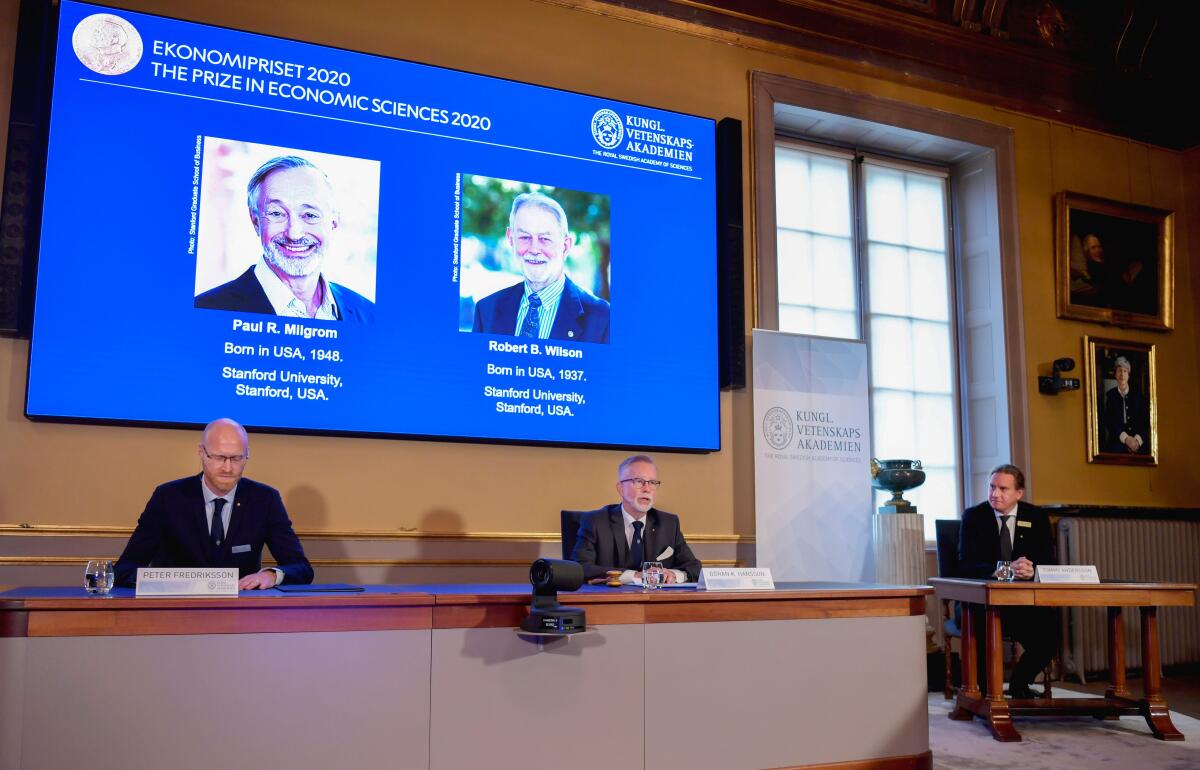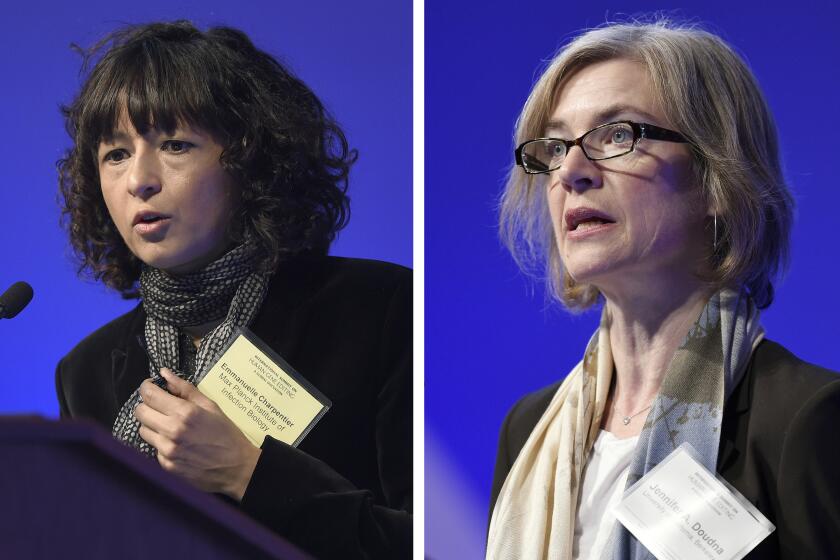Two Stanford professors win Nobel Prize in economics for their work on auction theory

- Share via
STOCKHOLM — Two Stanford professors won the 2020 Nobel Prize in economics Monday for improving the theory of how auctions work and inventing new and better auction formats that are now woven into many parts of the economy, including one that revolutionized the telecom industry.
The discoveries of Paul R. Milgrom and Robert B. Wilson “have benefited sellers, buyers and taxpayers around the world,” the Nobel Committee said, noting that the auction formats developed by the pair have been used to sell radio frequencies, fishing quotas and airport landing slots.
“Auctions are tremendously important,” Peter Fredriksson, the chairman of the Nobel economics committee, said at the announcement ceremony in Stockholm. “Every day they allocate astronomical values between buyers and sellers. They affect all of us, perhaps more than we think,” including through the setting of property values and electricity prices.
Stanford University said the two winners’ work helped shape the modern telecommunications industry after they developed a new format for the U.S. Federal Communications Commission’s radio spectrum auctions in 1994. That format has since been copied and adapted for dozens of auctions involving hundreds of billions of dollars worldwide.
Milgrom, 72, said he received news of his and Wilson’s joint win — which was announced well before dawn in California — “in a strange way.”
“I got a knock at my door from Bob Wilson,” he told the Associated Press. “He was my Ph.D. advisor, and he lives right across the street from me.”
The Nobel Prize in chemistry is awarded to Jennifer Doudna of UC Berkeley and Emmanuelle Charpentier for their work on the CRISPR gene-editing tool.
Milgrom said students, friends and colleagues had long suggested that he and Wilson might win the prize. “It’s really sweet, actually,” he said. “It’s nice to have their respect but their affection as well.”
Wilson, 83, described his former student as “sort of the genius behind all of this auction work,” noting that they first worked together on auctions in the 1970s.
“We’re really motivated to use theory in a very practical way to improve various economic processes,” Wilson said.
He said that his interest in auction theory dated back to the 1950s and that he thought the time for winning a Nobel Prize had already passed. He also struggled to think of an auction he himself had participated in. “My wife points out to me that we bought ski boots on EBay,” Wilson said. “I guess that was an auction.”
Poet Louise Glück wasn’t ready for her early-morning interview about winning this year’s Nobel Prize in literature. But her reaction was certainly amusing.
The economics prize was announced at a time when much of the world is experiencing the worst recession since World War II because of the COVID-19 pandemic.
“Since auctions are so important, designing them in the right way is absolutely key,” Fredriksson said. “The work of Paul Milgrom and Robert Wilson has allowed us to construct better auctions. They’ve applied auction theory to more realistic settings. Their basic research allows them to invent entirely new auction formats.”
The Nobel Committee said Wilson’s work showed “why rational bidders tend to place bids below their own best estimate of the common value” — that is, “the value which is uncertain beforehand but, in the end, is the same for everyone.”
“[Bidders] are worried about the winner’s curse — that is, about paying too much and losing out,” the committee said.
Milgrom developed a more general theory of auctions that takes into account what is known as the “private value” of what’s being sold, which can vary greatly from bidder to bidder.
The award, formally known as the Sveriges Riksbank Prize in Economic Sciences in Memory of Alfred Nobel, caps a week of Nobel Prize announcements. Since its establishment in 1969, the economics prize has been awarded 51 times.
The United Nations’ World Food Program has been awarded the 2020 Nobel Peace Prize for its efforts to combat hunger across the globe.
Last year’s award went to two researchers from the Massachusetts Institute of Technology and a third from Harvard University for their groundbreaking research on efforts to reduce global poverty.
Few economists could have predicted last fall that the globe would come to a virtual standstill within months as governments closed their borders, imposed lockdowns and ordered other measures to stop the spread of the coronavirus, triggering a sharp drop in business activity worldwide.
The prize comes with a cash award of 10 million kronor — about $1.1 million — and a gold medal.
Americans have figured prominently among this year’s Nobel winners. Leaving aside the peace prize, which went to the United Nations’ World Food Program, seven of the 11 laureates have been Americans, including researchers at UCLA and UC Berkeley.
“After the second World War there’s been an enormous investment in research and higher education in the United States, and that has paid off in all the sciences,” said Goran Hansson, secretary-general of the Royal Swedish Academy of Sciences. “And we’ll see how that trend may change in the future.”
On Oct. 5 the Nobel Committee awarded the prize for physiology and medicine for discovering the liver-ravaging hepatitis C virus. Tuesday’s prize for physics honored breakthroughs in understanding the mysteries of cosmic black holes, and the chemistry prize Wednesday went to scientists behind a powerful gene-editing tool.
The literature prize was awarded to American poet Louise Gluck on Thursday for her “candid and uncompromising” work.
More to Read
Sign up for Essential California
The most important California stories and recommendations in your inbox every morning.
You may occasionally receive promotional content from the Los Angeles Times.















